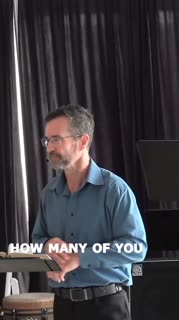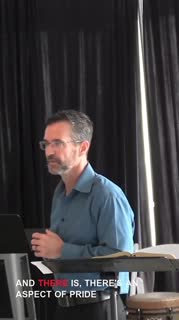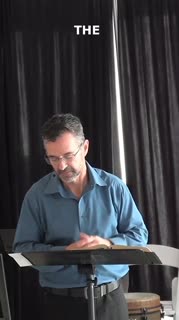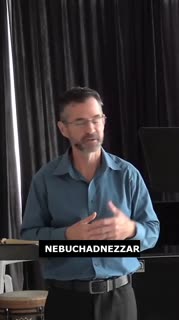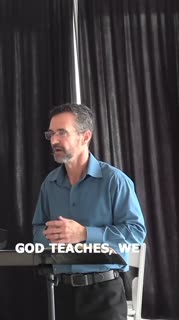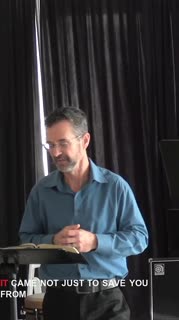From Pride to Humility: Nebuchadnezzar's Transformative Journey
Devotional
Sermon Summary
Bible Study Guide
Sermon Clips
Here are the selected quotes from the sermon transcript:
1. "How many of you have done a job interview recently? Maybe you got these questions about, tell us about your skills and what you do and this kind of stuff. But then they get into these personal questions of like, hey, tell us your greatest attribute. Tell us what you're really good at. And that question is usually, for most of us, pretty easy because we like to talk about ourselves, don't we? But then there's the next question comes, usually, and it's, tell us what you're weak at. What are your liabilities to me as your potential employer? What liability am I taking on? What am I getting here?" [06:32] (37 seconds)
2. "And there is, there's an aspect of pride that is good. We need to be proud of our children. We need to be proud of our accomplishments. We need to be proud of our country. But we can't let that pride get us. Because when that pride gets us, now we turn our eyes upon ourself. And we turn upon our eyes about what I have done, and the things I can do, and the things I have done, and you start to compare yourself to other people. And you start to go, hmm, they're not as good as me. See, this is Satan's number one trick he plays on us, is he gets us by pride." [07:54] (38 seconds)
3. "God's sovereignty and his glory requires humility from all. God's sovereignty and his glory requires humility from us all. Isaiah writes about this in chapter 2. He says in chapter 2, the haughtiness of man shall be humbled and the lofty pride of men shall be humbled. And the Lord alone will be exalted in that day. Because he's a jealous God, but he's a good God." [10:21] (41 seconds)
4. "Nebuchadnezzar looks in and says, surely this Most High God of Shadrach, Meshach, and Abednego is able to do this and he shall be praised. And he makes an edict and says, hey, anybody in my country who does not, or profanes the name of their... their God, I'm going to put you in the furnace, is basically what he says. And then he says, how great are the signs and how mighty the wonders. His kingdom is everlasting and His dominion endures from generation to generation. Here's King Nebuchadnezzar getting the idea that the one true living God is eternal all the way from the beginning of whenever time was, he knows, until eternity with Him." [12:30] (38 seconds)
5. "So Daniel in his care for him, he's speaking to him and basically what he's saying is, hey king, you used to praise the one true most high God. Now you're talking about being ease in your palaces and how good you are. And this dream has come to show you, you need to humble yourself before that one true God that you've forgotten about. It's easy for us, it's easy for us to, in our times of prosperity to forget who it is that put us in that prosperity. When we're struggling, it's easy for us to turn to God and say, help me, help me, help me. It's harder when things are good to say, help me, help me, help me, thank you. Thank you, Father." [22:49] (42 seconds)
6. "Nebuchadnezzar, when you go back to the verse, he says his reason returned to him in verse 34. He says, and he blessed the Lord. He praised him and he honored him. That's our application for today. Can you lift your eyes to the one true God through the resurrection of Christ? Can you bless God by thanking him for all he's done for you? Even allowing you to wake up this morning and come to church. You thank him for that. Can you praise him for all things in your life? Even those things that you wish you didn't have, they're there for a reason and a purpose." [34:37] (36 seconds)
7. "God teaches, we live in this sowing and reaping world. King Nebuchadnezzar sowed and he reaped. He sowed his pride and he reaped humility out of that, because God made him do it. Today, are you in that position where you're going to make God humble you before you say he is king of kings and lord of lords? Or are we going to follow Daniel and say, hey, this is today the day of redemption. Today, let's fix it. Not that we can do it. All you've got to do is just look up and say you are king of kings and lord of lords. You don't have to clean yourself up. God will do it for you." [36:59] (35 seconds)
8. "He came not just to save you from eternal separation. That is true. But he came to give you a new life and it starts now through Christ Jesus our lord. He's saying, I came to give you life. I have it more abundantly. It starts now. Not just when he calls us home. Maybe you get to go home. But through Christ. It's guaranteed. Confess your pride and ask the king of kings to bless you through his presence. Think about King Nebuchadnezzar. Whenever you say the word I. Let King Nebuchadnezzar pop in your mind. Go, hmm. Maybe I should look up to the heavens and say, thank you Jesus." [37:51] (44 seconds)
Ask a question about this sermon
1. "How many of you have done a job interview recently? Maybe you got these questions about, tell us about your skills and what you do and this kind of stuff. But then they get into these personal questions of like, hey, tell us your greatest attribute. Tell us what you're really good at. And that question is usually, for most of us, pretty easy because we like to talk about ourselves, don't we? But then there's the next question comes, usually, and it's, tell us what you're weak at. What are your liabilities to me as your potential employer? What liability am I taking on? What am I getting here?" [06:32] (37 seconds)
2. "And there is, there's an aspect of pride that is good. We need to be proud of our children. We need to be proud of our accomplishments. We need to be proud of our country. But we can't let that pride get us. Because when that pride gets us, now we turn our eyes upon ourself. And we turn upon our eyes about what I have done, and the things I can do, and the things I have done, and you start to compare yourself to other people. And you start to go, hmm, they're not as good as me. See, this is Satan's number one trick he plays on us, is he gets us by pride." [07:54] (38 seconds)
3. "God's sovereignty and his glory requires humility from all. God's sovereignty and his glory requires humility from us all. Isaiah writes about this in chapter 2. He says in chapter 2, the haughtiness of man shall be humbled and the lofty pride of men shall be humbled. And the Lord alone will be exalted in that day. Because he's a jealous God, but he's a good God." [10:21] (41 seconds)
4. "Nebuchadnezzar looks in and says, surely this Most High God of Shadrach, Meshach, and Abednego is able to do this and he shall be praised. And he makes an edict and says, hey, anybody in my country who does not, or profanes the name of their... their God, I'm going to put you in the furnace, is basically what he says. And then he says, how great are the signs and how mighty the wonders. His kingdom is everlasting and His dominion endures from generation to generation. Here's King Nebuchadnezzar getting the idea that the one true living God is eternal all the way from the beginning of whenever time was, he knows, until eternity with Him." [12:30] (38 seconds)
5. "So Daniel in his care for him, he's speaking to him and basically what he's saying is, hey king, you used to praise the one true most high God. Now you're talking about being ease in your palaces and how good you are. And this dream has come to show you, you need to humble yourself before that one true God that you've forgotten about. It's easy for us, it's easy for us to, in our times of prosperity to forget who it is that put us in that prosperity. When we're struggling, it's easy for us to turn to God and say, help me, help me, help me. It's harder when things are good to say, help me, help me, help me, thank you. Thank you, Father." [22:49] (42 seconds)
6. "Nebuchadnezzar, when you go back to the verse, he says his reason returned to him in verse 34. He says, and he blessed the Lord. He praised him and he honored him. That's our application for today. Can you lift your eyes to the one true God through the resurrection of Christ? Can you bless God by thanking him for all he's done for you? Even allowing you to wake up this morning and come to church. You thank him for that. Can you praise him for all things in your life? Even those things that you wish you didn't have, they're there for a reason and a purpose." [34:37] (36 seconds)
7. "God teaches, we live in this sowing and reaping world. King Nebuchadnezzar sowed and he reaped. He sowed his pride and he reaped humility out of that, because God made him do it. Today, are you in that position where you're going to make God humble you before you say he is king of kings and lord of lords? Or are we going to follow Daniel and say, hey, this is today the day of redemption. Today, let's fix it. Not that we can do it. All you've got to do is just look up and say you are king of kings and lord of lords. You don't have to clean yourself up. God will do it for you." [36:59] (35 seconds)
8. "He came not just to save you from eternal separation. That is true. But he came to give you a new life and it starts now through Christ Jesus our lord. He's saying, I came to give you life. I have it more abundantly. It starts now. Not just when he calls us home. Maybe you get to go home. But through Christ. It's guaranteed. Confess your pride and ask the king of kings to bless you through his presence. Think about King Nebuchadnezzar. Whenever you say the word I. Let King Nebuchadnezzar pop in your mind. Go, hmm. Maybe I should look up to the heavens and say, thank you Jesus." [37:51] (44 seconds)
